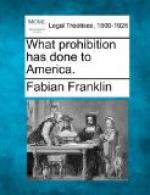To the exposition of those fundamental issues this little book has been almost exclusively confined. It has left untouched a score of aspects of the question of drink, and of the prohibition of drink, which it would have been interesting to discuss, and the discussion of which would, I feel sure, have added to the strength of the argument I have endeavored to present. But there is an advantage, too, in keeping to the high points. It is not to a multiplicity of details that one must trust in a case like this. What is needed above all is a clear and wholehearted recognition of fundamentals. And I do not believe that the American people have got so far away from their fundamentals that such recognition will be denied when the case is clearly put before them. There is one and only one thing that could justify such a violation of liberty and of the cardinal principles of rational government as is embodied in the Eighteenth Amendment. In the face of desperate necessity, there may be justification for the most desperate remedy.
But so far from this being a case of desperate necessity, nothing is more unanimously acknowledged by all except those who labor under an obsession, than that the evil of drink has been steadily diminishing. Not only during the period of Prohibition agitation, but for many decades before that, drunkenness had been rapidly declining, and both temperate drinking and total abstinence correspondingly increasing. It is unnecessary to appeal to statistics. The familiar experience of every man whose memory runs back twenty, or forty, or sixty years, is sufficient to put the case beyond question; and every species of literary and historical record confirms the conclusion. This violent assault upon liberty, this crude defiance of the most settled principles of lawmaking and of government, this division of the country—as it has been well expressed—into the hunters and the hunted, this sowing of dragons’ teeth in the shape of lawlessness and contempt for law, has not been the dictate of imperious necessity, but the indulgence of the crude desire of a highly organized but one-idead minority to impose its standards of conduct upon all of the American people. To shake off this tyranny is one of the worthiest objects to which good Americans can devote themselves. To shake it off would mean not only to regain what has been lost by this particular enactment, but to forefend the infliction of similar outrages in the future. If it is allowed to stand, there is no telling in what quarter the next invasion of liberty will be made by fanatics possessed with the itch for perfection. I am not thinking of tobacco, or anything of the kind; twenty years from now, or fifty years from now, it may be religion, or some other domain of life which at the present moment seems free from the danger of attack. The time to call a halt is now; and the way to call a halt is to win back the ground that has already been lost. To do that will be a splendid




